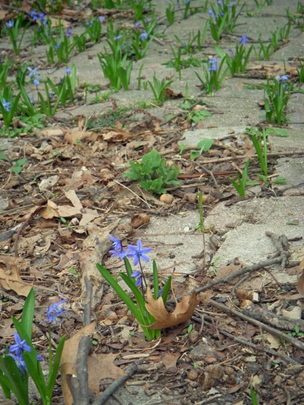Little bulbs, big spread

enlarge this imagePretty, blue, early, what's not to love about Siberian squill (Scilla sibirica)? Maybe the plant's ability to grow anywhere and prolific ways? Yet they do come and go early, and leave the space free for other plants, if we can just put up with a transition period featuring a carpet of yellowing grass-like leaves.
You won't beat 'em, so enjoy 'em!
We've heard this moan many times, "Why oh why did I ever plant
those (name of little, "naturalizing" bulbs)!? I will
never be rid of it, will I?"
Chances are that you're right. They're up early, gone early, and
wait out the summer in an untouchable dormant state. Short of
stripping out all the soil -- very careful not to drop any of it --
there's not much to be done that is effective. You might use a
kill-all herbicide in early spring and probably the following year,
too. Then, reseed or re-sod the lawn and re-stock the beds.
And hope those that escaped to neighbors' lawns and beds
suddenly become sterile.
Below: Squill bulbs are small but mighty. The one in the
center of the left photo will probably bloom, although it's tiny
compared to a miniature daffodil, dwarfed even by the
smallest lily bulb-let and not even as big around as a pencil. No
way could a gardener ever dig out those bulbs. As for knocking them
out with a herbicide, you have to sacrifice all the other plants in
the area and be out very early with the herbicide to catch their
leaves' debut in late winter. Even so, their foliage probably won't
absorb enough of the stuff to kill the whole bulb. They plants
would die down for the year with a sigh, "We'll be
baaaaack..."

